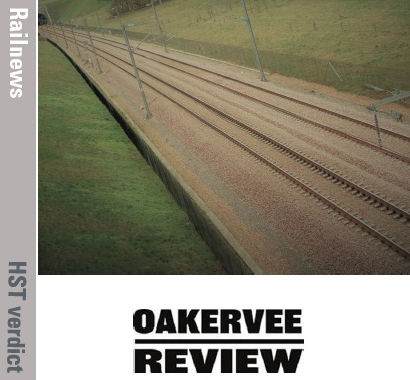► Primary advantage is capacity, not speed
► Costs remain uncertain, particularly for later phases
► HS2 must be part of national rail network
► Frequency should drop to 14tph, perhaps 16tph later
THE review of HS2 from former HS2 chairman Doug Oakervee has been published, to coincide with the Prime Minister’s statement to MPs.
He says that the advantage of HS2 is primarily that of improving capacity. Higher speeds, although still important, are not so vital.
The total cost of all phases now ranges from £80.7 billion to £87.7 billion at present day values, according to the ‘Chairman’s Stocktake’. But Oakervee warns that there is ‘considerable risk’ that the prices for Phase 1 will not remain at these levels without ‘rigorous cost controls’. Phase 2 is looking still more uncertain. Oakervee says estimates of costs and schedule on the following phases are ‘less mature’ than those of Phase 1.
He goes on to warn that ‘if Phase 2a [Birmingham-Crewe] proceeds as currently planned, the cost estimate may need to be revised upwards including, it is understood, in light of emerging estimates for land and property, systems and indirect costs. A higher cost contingency could be used on Phase 2a cost estimates. However, if more ground investigations take place and the design for Phase 2a matures, it may be possible to bring this cost contingency down.’
As far as Phase 2b [Crewe-Manchester and Birmingham-Leeds] is concerned, he says ‘the estimate of cost and schedule on Phase 2b is the least mature. Given Phase 2b’s relatively early stage of development, there are opportunities to make the design more efficient. If, however, Phase 2b proceeds as currently planned, the Review considers that the cost estimate may need to be revised.’
He also acknowledges the often-quoted price of all phases of £106.6 billion in 2015 prices, which came from consultant Michael Byng. Although Oakervee neither supports nor rejects this estimate, he comments: ‘The amounts allocated towards major construction works were too low, and the amounts allocated towards rail systems seemed too high. This view was confirmed by evidence provided to the Review by Network Rail.’
Doug Oakervee recommends that HS2 is planned as part of the National Rail network. ‘This includes links to existing railways but also to new investment proposals from Midlands Connect and Transport for the North and Network Rail’s Enhancements Programme.’
He also explains why cancelling HS2 was not a good idea.
He said: ‘The impact of cancelling HS2 would be significant. Costs incurred amount to approximately £9 billion, though some of these costs may be recovered with around £2 billion to £3 billion of land and property costs potentially recoverable, and additional direct costs of cancelling the project estimated at around £2.5 billion to £3.6 billion. There would also be significant detrimental consequences for the supply chain and the fragile UK construction industry and confidence if HS2 was cancelled.’
He does not, however, rule out some compromises, saying that the number of trains per hour should come down from 18tph to 14tph, with the scheme ‘future proofed’ for 16tph in future.


